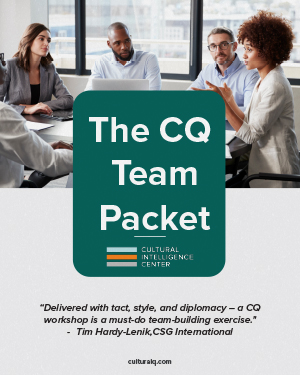In the race for global talent, employers and universities are looking for highly motivated young people who are self-aware, smart, and have an ability to influence and communicate across a myriad of differences. Are you ready?
70% of educators say their graduates are prepared for work. Less than 50% of students and employers agree.
And 90% of executives from 68 countries report that finding effective cross-cultural personnel is a top management challenge. (Economist Intelligence Unit)
As the world of work becomes more automated and robotic, cultural intelligence becomes a crucial way to stand apart. An avatar customer service representative can’t express empathy or engage in decision-making. And negotiation and trust-building can’t be easily outsourced. Now, more than ever, cultural intelligence becomes a critical part of preparing youth for their 21st century careers.
What Improves CQ Most?
What can students, parents, and educators do to give students’ the competitive edge that comes from improved cultural intelligence or CQ? As we work with high schools, colleges, and universities around the world, these are the kinds of initiatives that consistently enhance youth’s cultural intelligence.
Phase 1: Self-Awareness
Today’s youth put a higher priority on human rights and global consciousness than many generations before them. While there are notable exceptions, today’s adolescents and young adults are incensed by racism and discrimination. But many of them still lack the personal awareness that is the foundation for building cultural intelligence. What does it mean to understand and respect my cultural background while also respecting others’ backgrounds? How does my upbringing influence the way I make decisions and view the world? How might my minimization of cultural differences limit me? High school and university are the ideal times to wrestle with the crucial questions of identity and development. Use of the CQ Assessment alongside reflective writing exercises can be useful tools for promoting the self-awareness that is essential for enhancing youth’s CQ.
Phase 2: Meaningful, Immersion Experiences
Most educational institutions prioritize giving students the chance to experience another culture first hand. Whether it’s through study abroad programs or requiring some engagement with communities in nearby neighborhoods, there’s no substitute for experiencing other cultures firsthand. But as I consistently point out, not all immersion experiences are equal. If not done well, they can perpetuate ethnocentrism and erode cultural intelligence. But when designed using the research-based interventions that are proven to enhance cultural intelligence, they offer a transformative opportunity that will go with the young person for the rest of his or her life and career.
Phase 3: Intercultural relationships
Most students don’t need a passport to encounter diversity. Different cultures are as close as the person living in the dorm room next door. Yet university campuses continue to be extremely segregated. Chinese students socialize and study with Chinese students. Christian kids hang out with other Christians. And students from underrepresented cultures (e.g. African Americans in many U.S. business schools) eat together because they don’t feel connected to the majority community. Ironically, students often travel to the other side of the world to learn about different cultures yet come back on campus and default to only spending time with people like themselves. Schools that make an intentional effort to help students utilize the diversity across campus are more likely to simultaneously help their students improve their CQ.
Phase 4: Job Skills
As students become upperclassmen, the emphasis upon cultural intelligence needs to move toward preparing them for the workplace. Many job recruiters tell me they rarely hear students who can articulate how their study abroad experience will make them better at their job. High school guidance counselors and university career service advisors play a pivotal role in helping students develop the language and skills for describing how their journey toward cultural intelligence will influence the ways they teach, lead, manage projects, etc. This phase is where the cultural intelligence model and assessments are ideally suited. As compared to other intercultural inventories that focus on personal preferences and attitudes, the CQ Assessments predict students’ performance in culturally diverse settings.
Better College and Job Prospects
As admission to top universities becomes increasingly competitive, standardized test scores and impressive resumes of community service aren’t enough to get into many schools. A growing number of universities are prioritizing admission of students with “average” test scores who demonstrate self-awareness, curiosity, and people skills—all characteristics that are connected to cultural intelligence.
Executives from Google, Lenovo, McKinsey and several other leading companies consistently ask me, “Where do we find culturally intelligent young people?” They’re on the hunt for talent who have the skills that go beyond technical functions. As the linear and numerical functions become more automated, the most attractive employers are looking for young talent who have the people skills, self-reliance, teamwork, and ability to communicate effectively across a number of contexts and situations—all things that are shaped by one’s CQ. And as companies like Google and universities like Harvard adopt CQ as part of their assessment and development process, students who can describe and demonstrate their CQ have a distinct advantage.
It’s a whole lot easier to instill the values and skills related to cultural intelligence in youth than adults. We’d be delighted to work with you in that process. And best of all, when we improve the CQ of youth, we make the world of today and the world of tomorrow a better place for all of us.
